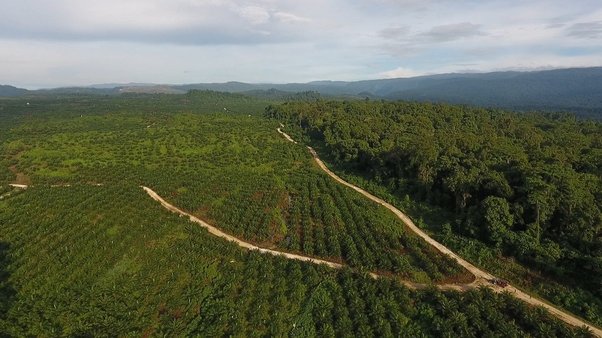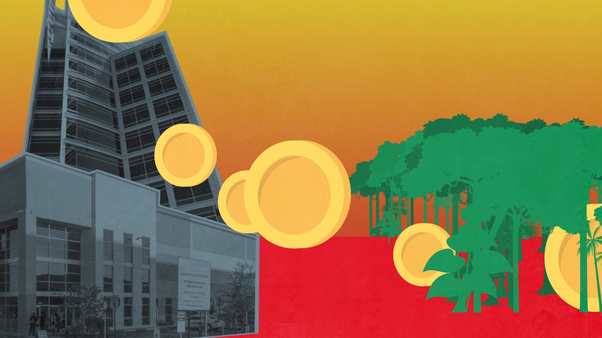UK banks have provided over £1 billion ($1.4bn) to "forest-risk" companies since world leaders signed a landmark agreement to end deforestation by the end of the decade at the COP26 climate conference in Glasgow in 2021, a new analysis from Global Witness has found. In addition, UK investors held £1.4 billion ($1.8bn) in bonds and shares issued by these companies as of July 2024.
This research, based on new data from the Forests & Finance coalition produced by Dutch research firm Profundo, tracks financial flows to more than 300 "forest-risk" companies directly involved in beef, palm oil, soy and other agricultural supply-chains driving most tropical deforestation.
Profundo’s methodology, including its criteria for a “forest-risk” company, is summarised in the methodology below.
Despite the UK government's commitment to end deforestation by 2030, British investors remain significant players globally when it comes to investments in "forest-risk" companies.
Excluding financial institutions based in tropical forest countries, UK financiers were the third largest investors in shares and bonds issued by "forest-risk" companies in 2024, trailing only the US and Japan.
Our analysis finds that of the top 50 largest UK investors in "forest-risk" companies – who account for 99% of total UK investments held in July this year – the majority still lack public commitments to remove deforestation from their portfolios.
Although 18 of the top 50 shareholders are signatories to the Net Zero Asset Managers’ initiative, just eight have made a clear public commitment to removing deforestation from their portfolios.
Global deforestation and degradation release an estimated eleven percent of greenhouse gas emissions, meaning there is considerable disconnect between "net zero” investors and their lack of deforestation policies.
UK banks also remain significant lenders and underwriters of "forest-risk" companies. British banks provided over £1 billion ($1.4bn) in credit to "forest-risk" companies between January 2022 to June 2024.
UK banks were the 10th largest creditors globally of "forest-risk" companies in this period, and the seventh largest when excluding banks based in tropical forest countries.

This puts the UK and other key financial centres far off track from the goal of the Glasgow Leaders' Declaration, signed by more than 140 nations at COP26, to halt and reverse global deforestation by 2030.
Under the declaration, signatories promised to realign financial flows with forest protection.
According to a recent assessment from the World Resources Institute, deforestation slowed last year in some parts of the world like Colombia and Brazil.
However, this progress was counteracted by "sharp increases in forest loss” in other regions like Bolivia, Laos, and Nicaragua.
Because many of the larger agribusinesses in the Forests & Finance study are large multinationals, financial transactions were adjusted downwards in Forests & Finance’s calculations to reflect only the portion of each company's operations involved in producing "forest-risk" commodities in affected regions, thereby excluding finance allocated to non "forest-risk" activities.
The figures are therefore conservative estimates of total financing channelled towards these companies.
The UK government is due to conduct a Treasury review of the effectiveness of existing regulations in preventing deforestation finance, after the House of Lords voted for a new due diligence law last year.
"Forest-risk" funding trio: HSBC, Barclays, and Standard Chartered
Our analysis of Forests & Finance’s data finds that just three UK banks accounted for 97% of UK credit provision for “forest-risk” companies since the Paris Agreement was signed at COP21 in 2015: HSBC, which provided £2.9 billion; Standard Chartered (£0.86bn); and Barclays (£0.75bn).
Together, this amounts to a total of £4.5 billion worth of credit provided to "forest-risk" companies between January 2016 and June 2024.
High Street bank HSBC accounted for over half (62%) of UK credit flows to "forest-risk" companies in this period.
Excluding banks based in tropical forest countries such as Brazil, Malaysia, and Indonesia, it ranked as the fifth-largest provider of credit to these companies since Forests & Finance started gathering its data in 2010 up until 2023.
Although HSBC, Barclays and Standard Chartered account for the lion’s share of UK financing to "forest-risk" companies, each of them was ranked among the top financial institutions globally last year for their approaches to deforestation by the Forest500 annual policy assessment tool produced by research group Global Canopy.
Their analysis looks at "overall approach" – for example, whether an institution has committed to ending deforestation in their borrowers’ or portfolio companies’ "high risk" supply chains by a certain date, as well as policies restricting investment in specific commodities.
According to Forest 500, Standard Chartered ranks fifth out of all banks assessed for its approach to deforestation, with a total score of 45/100; Barclays ranks sixth (43/100); while HSBC comes in at 11th place with an overall score of 34/100 points.
In some cases, the gap between policy and practice appears stark. Since HSBC implemented its 2017 forestry policy – where it promises not to provide services to customers either directly or indirectly involved in deforestation – it has supplied at least £1.9 billion ($2.4bn) in credit to "forest-risk" companies.
Credit provision from UK banks to "forest-risk" companies has declined, falling from £662m ($819m) in 2022 to £380m ($472m) in 2023, the latest year for which full data is available.
However, British banks have continued to fund some of the most controversial agribusinesses, including meatpacker JBS, major US-soy processor Cargill, as well as Brazil-headquartered beef and leather producer Minerva Foods – each of which have been mired in numerous controversies relating to deforestation or alleged human rights violations in recent years.
The British funders behind the chainsaw culprits
Part 1: Unmasking Cargill’s creditors
60% of tropical deforestation is linked to just three key products – beef, palm oil and soy. These products are then sold to consumers by major agribusinesses backed by British banks, such as JBS, Cargill and Minerva.
The supply chain of US-headquartered Cargill, the world’s largest agribusiness, is a key driver of global deforestation.
Despite its public commitment to be "deforestation and conversion free" in its soy-supply chain in Brazil, Argentina and Uruguay by 2025, and all other areas of South America by 2030, multiple reports have exposed shortcomings in the company's supply-chain monitoring systems.
Last year, Global Witness reported that Cargill is failing to collect basic tracking information about its supply chain and directly purchased soy from farms in Bolivia, where more than 20,000 hectares of forest have been razed since 2017.
Separately, climate-focused charity ClientEarth has also raised a legal challenge over its alleged failure to remove deforestation and human rights abuses from its soy supply-chain in Brazil.
Nevertheless, UK banks have remained important to Cargill’s operations in recent years. For example, HSBC, Barclays and Standard Chartered rank fifth, seventh and 12th respectively among the top creditors of Cargill’s "forest-risk" operations between 2017 and 2023.
Despite HSBC’s 2017 pledges to not “knowingly” finance high-risk customers involved directly or indirectly in deforestation, it increased its financing to Cargill’s soy operations in Brazil by 112%, between 2022 and 2023, according to data from Forests & Finance.
HSBC declined to comment on Global Witness’ findings, although in a response to a request for comment, the bank directed us towards its 2024 Net Zero Transition plan, which reiterates its policy of requiring customers involved in the production of palm oil, timber, and soy and cattle products to “operate in accordance with sustainable business principles,” and for customers in palm oil and timber production to obtain certifications such as "no deforestation, no peat and no exploitation" policies.
HSBC also said that they “perform due diligence on customers involved with soy and cattle production where sustainability risks are high.”
Standard Chartered, which quadrupled its financing to Cargill’s soy operations in Brazil in that same period, from approximately £0.4m ($0.5m) in 2022 to £1.6m ($2m) in 2023, appears to have weakened its deforestation policy in certain respects in recent years.
In 2018, the bank claimed that it would not finance "operations that grow, process or trade soy from the Brazilian Amazon and Cerrado," where Cargill “maintains a significant presence.”
However, in 2020, the bank updated its policy to state that it would now finance clients “that are committed to sustainably source, process and trade soy from the Cerrado.”
Standard Chartered also said in response to a request for comment that it would not comment on the details of specific relationships, although the bank did note that this update to its position on soy “was updated more than four years ago” and therefore “is not new in terms of our Position Statement on Soy.”
It also noted that the bank seeks to “minimise the impact [its] operations have on nature,” including by engaging clients through its “Environmental and Social Risk Management Framework”.
The bank also directed us to its latest statement on Agribusiness, in which the bank commits, amongst other things, not to provide services to clients who grow soy in the Brazilian Cerrado, and to only provide financial services to customers sourcing, processing or trading soy from this biome if they have made commitments not to engage in deforestation.
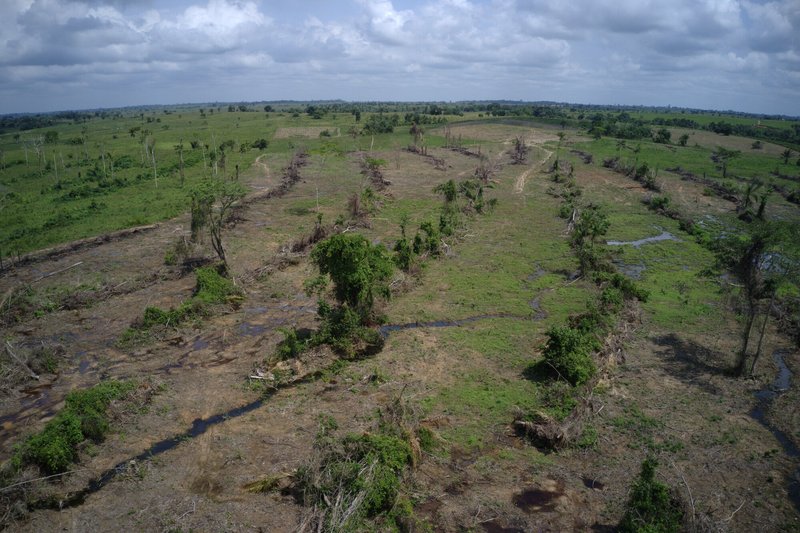
Agribusiness is a key driver of global deforestation, such as in region of Marabá, Pará State, Brazil. Global Witness
In response to the financial sector’s lack of adequate deforestation policies, Emma Thomson, Forest 500 and Tracking Lead at Global Canopy, told Global Witness that although the sector is “starting to wake up to the importance of acting on deforestation risk,” fewer than half of the financial institutions channelling the most money into the most exposed companies have deforestation policies.
Thomson added that where policies do exist, they often contain “significant gaps.”
For example, “evidence of adequate implementation is often non-existent, while awareness of the human rights abuses that are intrinsically linked to deforestation and ecosystem conversion is staggeringly low.”
The ability of banks like HSBC and Standard Chartered to dilute or even circumvent their own policies exposes the risks of relying on promises and self-regulation.
For example, Standard Chartered’s policy relies on self-reporting from Cargill to prove it is committed to “sustainable sourcing”.
The accuracy of Cargill’s self-reporting was called into question by a research paper recently published by financial research firm Anthropocene Fixed Income Institute (AFII), which claimed that Cargill relies on “estimates” to determine the share of its soy supply-chain that is deforestation-free.
AFII suggests that Cargill’s self-reporting may be insufficient to meet new regulatory standards, such as the incoming EU Regulation on Deforestation-free products (EUDR).
The regulation, which was due to take effect from the end of this year but may be delayed, imposes fines and penalties on companies knowingly trading in goods grown on deforested land, which could expose investors to bond pricing risks.
In response to these claims, a representative for Cargill said: “To protect South America’s natural ecosystem, Cargill accelerated our timeline to eliminate deforestation and land conversion from our direct and indirect supply chains for in-country origination of row crops (soy, corn, wheat, and cotton) in Brazil, Argentina, and Uruguay by 2025.”
Cargill claims to have mapped 100% of its direct suppliers in Brazil, and claims to use technology to establish greater traceability.
In addition, Cargill stated that it “shares the European Union's vision of combating deforestation and forest degradation linked to the production of raw materials and agricultural products, notably cocoa, cocoa-based products, chocolate, palm oil, soy and products derived from these raw materials. Cargill will be compliant when the regulation takes effect.”
The UK’s incoming trade legislation under the Environment Act 2021 has also stalled without a clear date for entry into force, and only applies to the import of goods grown on illegally deforested land.
This places the UK behind the EU in terms of the comprehensiveness of its deforestation regulation and, as Global Witness has repeatedly raised, also means that the UK creates a “perverse incentive for countries to weaken legal protections for forests so they can retain access to the UK market.”
Global Witness has previously revealed how UK imports of commodities including palm oil, soy and beef have been linked to deforestation covering an area nearly twice the size of Paris during the delay bringing forward the UK’s trade law.
The UK Retail Soy Group, which represents international retailers, has called on the Labour government to legislate urgently and move closer to the EUDR model, warning that “inaction puts the UK at risk of becoming a dumping ground for deforestation-connected commodities.”
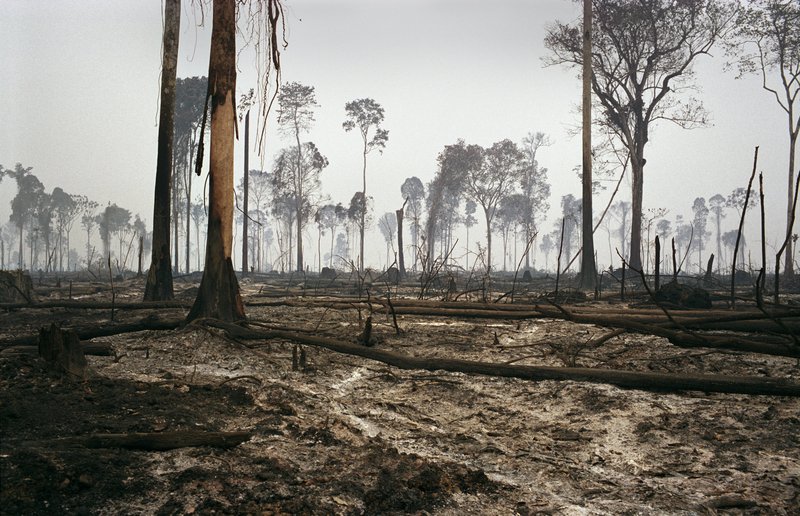
Part 2: JBS, Minerva, and Britain’s beef with forests
Brazilian beef producers JBS and Minerva also stand to fall short of compliance with the EUDR, according to a 2022 report from Chain Reaction Research.
The report notes that, at the time of publication, both companies monitored only illegal deforestation linked to their suppliers, while the upcoming EUDR will also consider Brazilian legal deforestation as non-compliant.
JBS has set a target to achieve deforestation-free supply chains (both legal and illegal deforestation) in the Amazon by 2025, but maintains only a commitment to achieve illegal deforestation-free supply chains in other biomes.
As a result, these companies’ financial backers are exposed to “transition risk”, which refers to the financial impacts of regulatory changes that result from the transition towards a greener economy.
According to Forests & Finance, HSBC was the third largest backer of Minerva between 2016-2023, after two Brazilian banks: Itaú Unibanco and BTG Pactual.
Just this month, Global Witness exposed Minerva, alongside beef giant Frigorifico Concepción, as being supplied by sixteen cattle companies responsible for 75,000 hectares of deforestation in Paraguay’s Gran Chaco, an area almost the size of New York City.
Minerva is among the handful of companies flagged by Forest500 for failing to set an overarching commitment to eliminate deforestation in its supply chain – currently, Minerva has only committed to ending all ties to "illegal" deforestation, and told Global Witness that it “follows the principles of environmental legislation in force in each country where it operates.”
Independent research by Global Witness using data retrieved from Refinitiv Eikon shows that Barclays has consistently been among meatpacker JBS’s top global financiers across the group.
Concerns over JBS’s governance and its links to environmental destruction are reinforced by the state of New York’s lawsuit against the company’s US branch, for allegedly "misleading" clients over its climate pledges.
Our research shows that Barclays was the top global provider of credit to JBS’s global operations, providing $5 billion out of a total $30 billion given by banks to JBS between 2017-2023. This amounts to 17% of total credit received by JBS in this period.
Barclays was also one of the banks which controversially underwrote three so-called sustainability-linked bonds issued by JBS.
These are a type of bond which promises certain environmental actions by the issuer — however JBS’s bonds are reportedly subject to a whisleblower complaint with the US financial watchdog, the SEC.
Global Witness recently revealed that Barclays earned $1.7 billion from financing JBS between 2018-2023 – a period in which the meat company’s operations contributed to the invasion and destruction of the Apyterewa Indigenous territory in Brazil.
In response to our reporting, Barclays told Global Witness that in April 2023 the bank updated its financing policies to “include restrictions on beef production and primary processing in high deforestation risk countries in South America, and to set a requirement for these companies to commit to respect human rights across their operations and supply chain.”
Barclays also claimed that it has “not provided any financing to entities in Brazil engaged in these activities since 2021,” although Global Witness analysis shows the bank continued providing finance to other entities within the JBS group in the US.
This may constitute “Greenlaundering”, which allows banks to circumvent restrictions by funding multinationals through subsidiaries in jurisdictions outside the scope of exclusion policies.
The UK advocacy group Tax Justice Network, which initially coined this term, recently released a report on this common tactic in the fossil fuels industry. Now, this practice may be being used in "forest-risk" financing.
In September 2023, just over two months after Barclay’s policy was formally implemented, the bank provided $226m in credit to JBS USA via bond underwriting.
Between September and October 2023, Barclays provided an estimated $160m to JBS subsidiary Pilgrim’s Pride. The bank made an estimated $2.6m profit from deals to JBS and its subsidiaries in 2023 alone.
Martin Bowman, Senior Policy and Campaigns Manager at campaign group Feedback, told Global Witness that the fact that Barclays can remain a major backer of JBS and not contravene its new deforestation policy “sets off major alarm bells.”
According to Bowman, Barclays “justifies this by saying they only finance JBS’ US and European subsidiaries – despite the fact that profits from these subsidiaries flow to the parent company.”
According to research from Feedback, which finds that Barclays was the world's largest creditor of JBS between 2015 and 2022, JBS USA was directly involved in importing meat from its parent company’s operations in South America, with 15.9% of JBS USA LLC’s import shipments coming directly from Brazil, often from JBS S.A.
Bowman told Global Witness that Barclays’ US and European subsidiaries “still contribute enormously to the company’s environmental impacts via their outsized livestock emissions and land use impacts.”
In response to the above claims, a Barclays spokesperson declined to comment on “specific clients”, but said: “Our Forestry and Agricultural Commodities Statement outlines our numerous restrictive policies on the four soft commodities that are widely recognised as the most significant drivers of deforestation globally.
"We were pleased to be recognised in February by Global Canopy Forest500 for our increased reporting and strengthened policies on deforestation.”
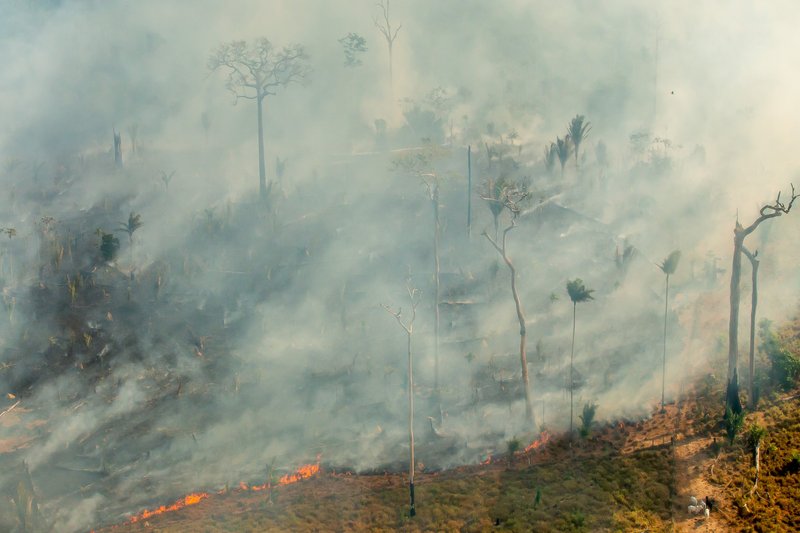
Financial flows to more than 300 "forest-risk" companies, directly involved in beef, palm oil, soy and other agricultural supply-chains driving most tropical deforestation. Lela Beltrão / Sumaúma
Part 3: from London to Liberia with Silchester International Investors
Global Witness’s analysis found that the largest individual UK investor in "forest-risk" companies was Silchester International Investors (SII), a company which remains both without a deforestation policy and a net-zero commitment.
SII held £330m ($418m) out of £1.4 billion ($1.8bn) in investments held by UK investors in "forest-risk" companies as of July 2024.
Nestled in the heart of London’s upmarket Mayfair, close to luxury brands Hermès and Burberry, SII’s sleek London offices are a world away from the forests whose produce lines its investors’ pockets.
Most of Silchester’s "forest-risk" investments (£219m) are held in palm oil producer Golden Agri Resources (GAR), whose operations in Indonesia and Liberia have been linked to deforestation, land grabbing and human rights violations.
Last year, GAR announced it was dropping its membership of the High Carbon Stock Approach (HCSA) "No Deforestation" initiative, which makes it especially concerning that SII does not have a single deforestation policy in place.
According to a 2018 Financial Times article, SII’s chief investment officer Stephen Butt, was “one of the UK’s richest fund managers.”
In response to a request for comment, Silchester claimed it has “integrated ESG factors into its investment process for nearly 30 years.”
Silchester added that as it is not a private equity firm, it does not “take operational control over our portfolio companies and/or control their boards.”
Instead, Silchester is a “minority shareholder in publicly traded companies,” which the company asserts is “materially different from providing loans, buying bonds or other financing activities” because “a company only receives new financing from shareholders if the company conducts a rights issue or primary placement of securities.”
Silchester also disputed holding investments in two other "forest risk" companies listed in Profundo's database.
The expectations are based on the principles that deforestation is also a climate issue, and that it poses financial risk to investors and banks at both top-down systemic and bottom-up individual company levels
Silchester accepts that it does hold investments in Golden-Agri, but maintains that since, during the period of this report, "Golden-Agri did not conduct any rights issues or issue new stock ... Silchester has not provided any financing to Golden-Agri.”
Silchester also said that it “has encouraged Golden-Agri’s board of directors to consider ESG factors in their business plans” and it “expects that all portfolio companies, including Golden-Agri and Sumitomo Rubber, will comply with local laws and regulations in each jurisdiction in which they operate.”
André Ranchin from UK-based consultancy firm Hymans Robertson told Global Witness that in his experience, “very few” asset owners have deforestation policies in place.
That is despite "a lot of them” setting net zero ambitions and monitoring their climate risks.
Ranchin added that while many of his clients, who are mainly UK-based pension funds, are aware of the environmental and social impacts of deforestation, “they need convincing that [deforestation] has a financial risk element to it as well.”
That all banks should set a public commitment to deforestation and conversion-free banking across all their activities is a key recommendation from the Finance Sector Deforestation Action initiative (FSDA).
Launched with support from the UK at COP26, the initiative recently published a new set of expectations for banks to follow when it comes to deforestation.
The FSDA commits members to make “best efforts” to eliminate deforestation caused by “high-risk commodities” from their investment and lending portfolios by 2025.
Lucia Graham-Wood, from the Institutional Investors Group on Climate Change, which manages the FSDA, told Global Witness that these expectations “reflect the fact that banks are uniquely positioned to tackle deforestation through engagement across value chains, their financing decisions and encouraging best practice and transparency among clients.”
Eats shoots and Reeves: Labour’s opportunity to act
Last year, the House of Lords voted in favour of a new financial due diligence law to force financial institutions to carry out checks on their clients to ensure they have systems in place to prevent deforestation and land grabs. This historic vote was achieved with Labour and the Liberal Democrats’ backing.
This ultimately resulted in an amendment to the Financial Services and Markets Act, commissioning a new review by the Treasury into deforestation finance in the UK.
The Treasury’s review will assess the extent to which current financial regulations are sufficient to curb financing of illegally produced "forest-risk" commodities.
The previous government also committed to developing due diligence standards for the financial sector as part of the Treasury review.
A similar review of the role of European private financial institutions in driving global forest loss is underway in the EU, under the EUDR, currently due to report in 2025.
Multiple expert bodies have urged the UK government to introduce a new law after concluding voluntary pledges and disclosure schemes are inadequate.
In January this year, the UK’s Environmental Audit Committee recommended a new due diligence law for financial institutions in its inquiry on global deforestation.
An earlier review by the Global Resource Initiative taskforce – an independent cross-sector body established by the UK government – also concluded in favour of a new financial law.
In a letter sent to Global Witness and other NGOs on the 12th September 2024, Tulip Siddiq, Economic Secretary to the Treasury, reaffirmed Labour’s commitment to conducting the review, adding that the government is committed to “working with UK financial institutions to further tackle deforestation-linked finance.”
The Labour government has pledged to end the global “nature emergency”, and in its party manifesto in the 2024 General Election, claimed the Conservative government “squandered our leadership” by failing to deliver COP26 pledges like the Glasgow Leaders’ Declaration.
Foreign Secretary David Lammy has vowed to put climate change and nature loss at the heart of the UK's foreign policy.
To achieve this, the UK will need to engage with producer countries to ensure new due diligence laws end the UK’s finance and trade contribution to global deforestation.
In the absence of stricter rules, the UK is failing to adequately curb the flow of finance from the City of London to companies driving deforestation in climate-critical forests.
Global Witness is calling on the UK government introduce secondary regulations to Schedule 17 of the Environment Act as soon as possible, with a requirement for companies to collect full traceability information about their supply chains, and to initiate the Treasury review of deforestation finance immediately, to deliver global commitments to end deforestation by 2030.
Methodology
The Forests & Finance coalition dataset, produced by Profundo and analysed by Global Witness, identifies financial transactions with more than 300 company groups that are involved in the upstream segment of the beef, palm oil, pulp and paper, rubber, soy and timber supply chains in Southeast Asia, Central and West Africa and South America, collectively referred to as “tropical forest-risk sectors”.
Profundo notes that this selection of “forest-risk companies” is “intended to be a representative sample of companies most impacting tropical forests. Factors that led to their selection include the size of the company and land area of operation, access to information on their financing, and known negative impacts of their operations on tropical forests.”
More information on companies' selection and financial flows methodology is available here. Profundo’s data is compiled from Bloomberg, Thomson Reuters Eikon, Orbis and other sources, along with company reports.
The dataset captures five types of asset class and transaction, split into investments (2024; bondholding and shareholding), and credit (2010 – 2024; revolving credit facilities; loan issuance; bond and share issuance).
Profundo applied "segment adjusters" to each company to estimate how much of a given portion of total finance could reasonably be expected to have financed the production or trade of a "forest-risk" commodity.
That means, for example, that finance provided by a UK financial institution to the US branch of a global conglomerate company like JBS or Cargill is discounted, meaning all financing in this dataset are Profundo’s estimates of funding allocated towards commodity production in regions where deforestation occurs.
For Global Witness’ independent analysis of JBS’s backers, we applied a similar approach to Profundo to estimate the total value of credit provided to JBS’s entire operations from each bank, without applying segment adjusters to the final amounts.
